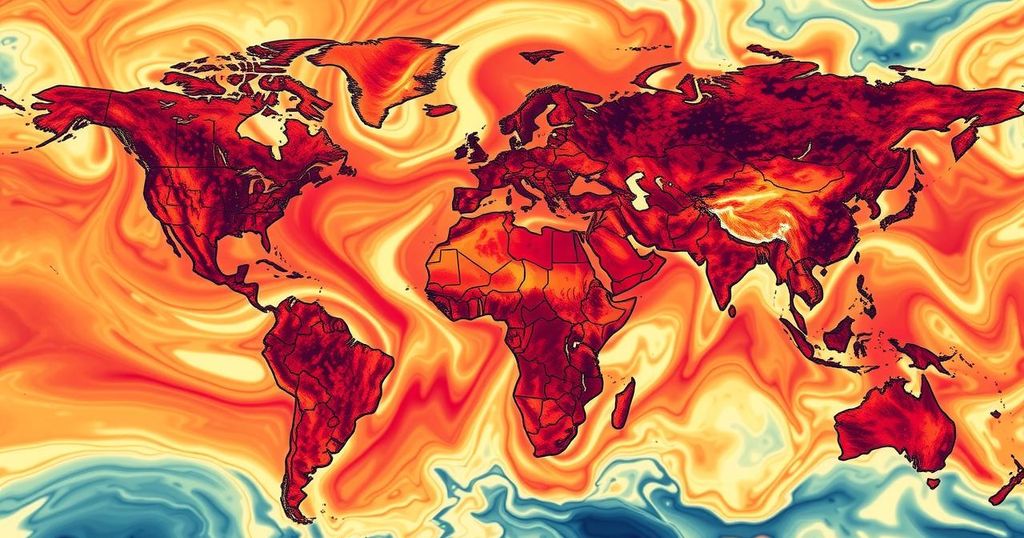Weather
AFRICA, ANTARCTICA, ANTÓNIO GUTERRES, ANTONIO GUTERRES, AUSTRALASIA, BURGESS, CLIMATE, CLIMATE CHANGE, COPERNICUS CLIMATE CHANGE SERVICE, EGYPT, EU, EUROPEAN CENTRE FOR MEDIUM - RANGE WEATHER FORECASTS, GLOBAL WARMING, GREENHOUSE GAS EMISSIONS, LOS ANGELES, NORTH AMERICA, SAMANTHA BURGESS, UN, UNITED STATES, WEATHER
Amira Khan
0 Comments
Record High Global Temperatures in 2024 Highlight Urgent Climate Crisis
In 2024, global temperatures reached a record high of 1.6 degrees Celsius above preindustrial levels, marking the hottest year on record since 1850. This surge in temperature is linked to human-induced climate change and has intensified natural disasters worldwide. Extreme events, including catastrophic wildfires in Los Angeles, emphasize the urgent need for global action to mitigate greenhouse gas emissions and transition to sustainable energy practices.
In 2024, the world experienced uncharted climate highs, indicating a significant warming milestone that scientists had aimed to avoid. Revealed by the EU’s Copernicus Climate Change Service, global temperatures surged to 1.6 degrees Celsius above preindustrial levels, marking the hottest year recorded since 1850. The findings underscore the urgent need for global action in mitigating greenhouse gas emissions, as averages reached 15.10 degrees Celsius (59.18 degrees Fahrenheit) for the year. This alarming temperature increase fueled a surge in extreme weather events, including devastating wildfires in Los Angeles that claimed lives and caused widespread destruction. Central to this climate emergency is a direct link to human activities, particularly emissions from fossil fuels and increasing energy demands exacerbated by technological innovations.
Furthermore, the report indicated that every year from 2015 to 2024 ranks among the top ten warmest years on record. July 22, 2024, set a daily global temperature record of 17.16 degrees Celsius (62.89 degrees Fahrenheit). Most continents experienced their warmest years to date, and the linkage to human-induced activity was unmistakable. Samantha Burgess of the European Centre for Medium-Range Weather Forecasts highlighted the extreme ramifications of high global temperatures, stating that they contributed to severe natural disasters worldwide.
This data paints a sobering picture of our climate trajectory and highlights the pressing need for immediate and substantial actions to address the climate crisis. Scientists emphasize the necessity of systemic changes in energy production and consumption to curtail ongoing temperature increases and their associated negative impacts on societies around the globe.
The article elaborates on the findings from the EU’s Copernicus Climate Change Service regarding the alarming rise in global temperatures in 2024, which surpassed the previously established targets set forth by climate scientists and global leaders. The importance of maintaining temperature increases below 1.5 degrees Celsius above preindustrial levels has been a focal point in climate discussions, particularly during international climate conferences such as COP27. By exceeding this threshold, the implications for natural disasters and climate crises intensify, drawing critical attention to the human activities that drive climate change.
The events of 2024 serve as a critical warning about climate change, revealing the consequences of rising global temperatures and reinforcing the call for urgent collective action. With the year marking the hottest on record, the frequency and severity of weather-related disasters are likely to escalate if immediate measures are not implemented to reduce greenhouse gas emissions. The interconnectedness of human activities, energy demands, and climate change must be addressed proactively in order to secure a sustainable future for our planet.
Original Source: www.cnet.com




Post Comment